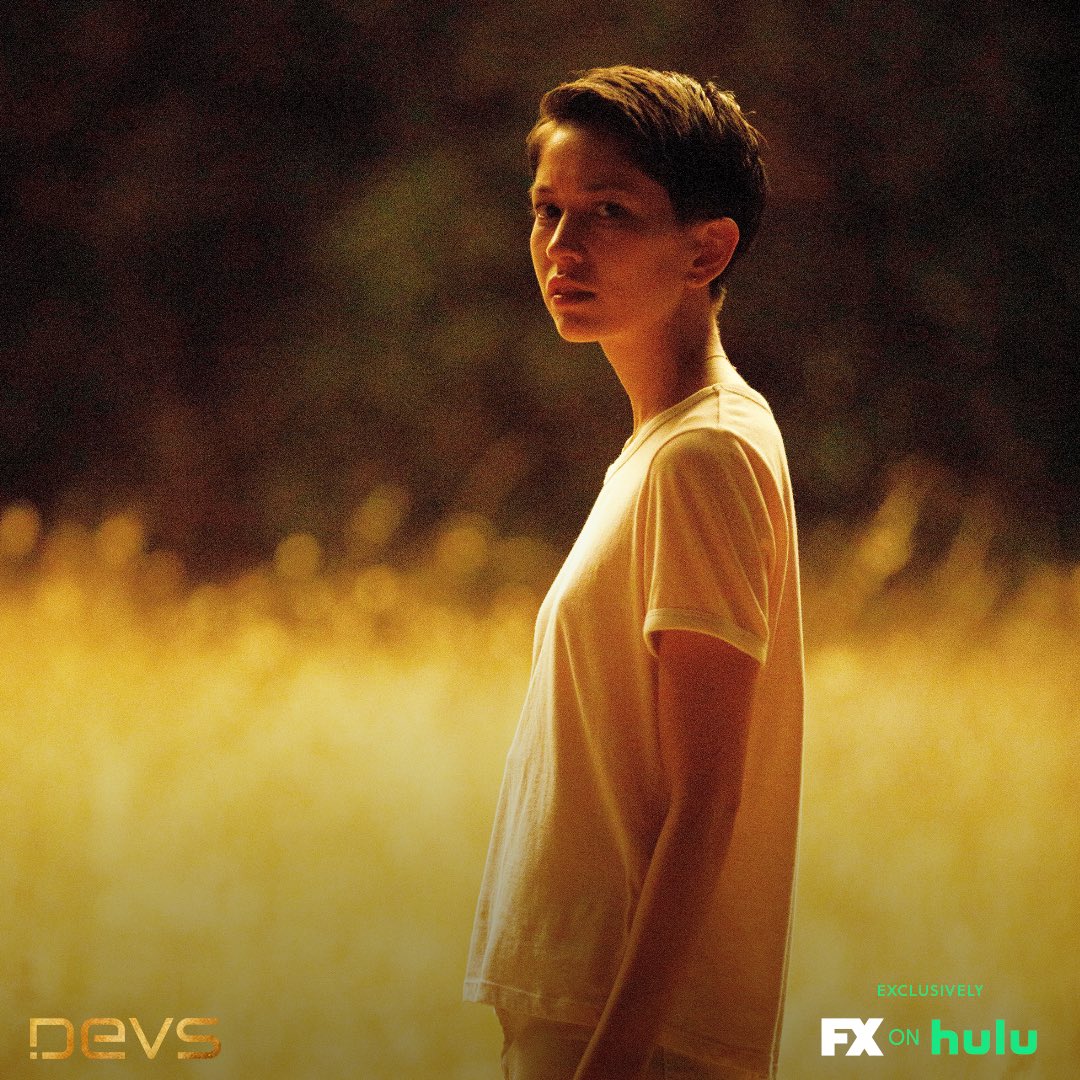
Film Editor Matt Taylor urges you to watch Alex Garland’s Devs, a superbly-executed sci-fi series about fate and free will
‘No man ever steps in the same river twice, because it is not the same river, and he is not the same man.’
Individual voices in film and television are something special, something to be treasured. Voices such as Greta Gerwig, Ari Aster, Jordan Peele, and Damon Lindelof need to be heard if we are to continue receiving the transcendental sorts of work that these four (to name but a few) consistently produce. Alex Garland is one such voice; the former novelist turned screenwriter/director has been one to watch ever since his directorial debut of Ex Machina put him on the map, and his second feature, Annihilation, was among the best science-fiction films this side of 2001. After a two-year hiatus he’s back, this time on the small screen with Devs, an FX original series (available to stream on BBC iPlayer) that feels perfectly in line with everything we’ve seen from him before, while also breaking into some seldom-tread science-fiction grounds.
The eight-episode miniseries follows the character of Lily (an excellent Sonoya Mizuno) as she investigates the mysterious disappearance of her boyfriend Sergei (Karl Glusman). Last seen at their workplace of tech giant Amaya, Lily dives head-on into trying to find Sergei, but is met with resistance from company CEO Forest (a surprisingly grounded Nick Offerman). To give away more than this would be unnecessary; as with Garland’s previous works, they are best experienced with as little prior information as possible.
Devs grapples with heavy and relevant ideas that extend beyond the genre limitations of science-fiction
One of Garland’s greatest strengths as a filmmaker is the way in which Devs grapples with heavy and relevant ideas that extend beyond the genre limitations of science-fiction into how we perceive the world around us. Ex Machina explores how we feel about the creation of artificial life, as well as the potential that that AI holds, while Annihilation is ultimately about self-destruction. Devs is no different; the main themes at its core are those of fate and free will in relation to the concept of determinism, while the series also explores religion and faith in great depth, and encourages viewers to think about what we choose to do with these ideas.

To divulge how Garland examines these concepts would be to spoil one of the most remarkable things about Devs. As with Ava and the Shimmer in Garland’s previous efforts, there is a central plot device in Devs that allows these ideas to be explored through both character and narrative – and as he proved with both of those films, he is beautifully able to balance these three things together. The main questions Devs asks us are those related to the aforementioned ideas of fate and free will: how much control, if any, do we have over our own lives? Is our every action preconceived? Or do the tiniest decisions we make impact the whole world around us? And if we knew our ultimate fate, would we do anything to change it? These are grand questions that no one really has the answers too, but Devs’ suggestions are utterly fascinating and lead to some of the best moments of the entire series.
But of course, ideas are meaningless without anything to ground them. Luckily, Garland’s excellent cast and crew are on hand to help; all are stunning. Mizuno leads the cast as Lily, a computer programmer who refuses to believe what she’s told about Sergei’s disappearance. She’s smart, resourceful, and Mizuno plays her beautifully. The choices she’s faced with towards the end of the series hit home in the viewer because the dilemmas feel earned and real, thanks to a combination of Garland’s dialogue and Mizuno’s winning performance.
Offerman proves himself a more than worthy dramatic actor,
Perhaps one of the biggest surprises of the entire series is Nick Offerman (Parks and Recreation, the Jump Street movies) as Forest. In a turn far removed from his usual comedic roles, Offerman proves himself a more than worthy dramatic actor, imbuing his every line and scene with a warm energy that adds a more personal weight to the proceedings. His backstory makes him an innately sympathetic character, but his actions throughout the series make us question how far he does deserve that sympathy, and Offerman walks the line between these two perfectly. It also goes without saying that his luscious voice is one of the highlights of his performance, and, personally, I could listen to Offerman wax lyrical about free will and fate for the entire length of the series and never get bored.
Outstanding supporting roles go to Jin Ha as Lily’s ex-boyfriend Jamie, who she goes to for help in locating Sergei, Alison Pill as Katie, Forest’s second-in-command who isn’t afraid to question him when she feels the need to, Zach Grenier as Kenton, head of security at Amaya who serves as every possible kind of roadblock in Lily’s quest, and Stephen McKinley Henderson and Cailee Spaeny as Amaya employees Stewart and Lyndon respectively, part of the team working on the secret Devs project. No matter how much or how little screentime each has, they all shine in their roles. Garland’s meaty dialogue gives each of them plenty to work with, and they all leave everything on the table.
His choice of production team lends Devs the extra power it needs to land with such force and grace
As we’ve come to expect from Garland by now, his technical prowess behind the camera is second to none. His direction of all eight episodes is as sure, steady, and confident as we’d hope, and his choice of production team lends Devs the extra power it needs to land with such force and grace. Rob Hardy’s cinematography is utterly gorgeous, lending outdoor locations a feeling of freedom and mystery, which, when coupled with an earth-shattering score from Annihilation composers Ben Salisbury and Geoff Barrow that feels almost religious in places, takes the very feeling of the series into something resembling ethereality. Mark Digby’s production design and Michelle Day’s set decoration lend the very texture of Devs an otherworldly feeling, particularly within the Devs building itself; the way that light bounces off the walls of the labs make the building feel alive somehow, tying into the idea that there may be other, larger forces at work outside our lives that Garland grapples with so heavily.

It all comes together to create a magnificently slow-paced science-fiction series, that only really has one issue: its pacing. Garland is no stranger to slow sci-fi – either of his previous films would tell you that – but sometimes Devs feels too slow for even the most patient of viewers. Episodes three and six, in particular, feel almost like filler; these episodes could be cut entirely, with their important moments displaced into the episodes around them, and nothing would be lost. Perhaps the atmosphere of the show may be affected slightly, but it would certainly flow much better than it otherwise does.
Sometimes Devs feels too slow for even the most patient of viewers
Having said that, this is an admittedly extremely minor quibble that has little impact on the overall quality of Devs: Alex Garland has yet again delivered audiences a quiet, introspective, deeply affecting piece of science-fiction that stands as proof, if further proof were needed, that he is one of the most fascinating minds working in the genre today. Though it may not quite reach the dizzying heights of either Ex Machina or Annihilation, audiences can rest assured that, as long as we have people like Garland around, the genre is in extremely capable hands.
Rating = 4/5
Can’t get enough of Sci-Fi? Check out more reviews here:

Comments